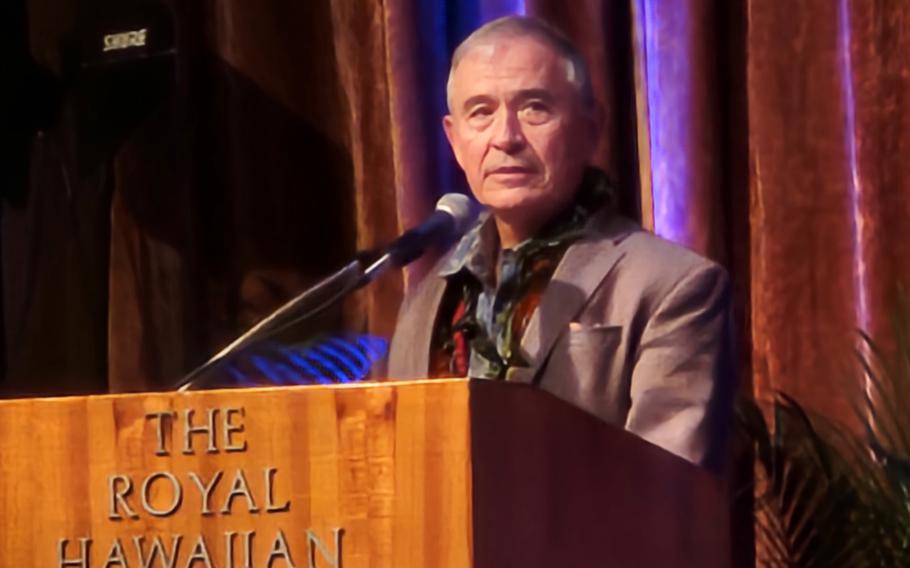
Retired Adm. Harry Harris, former commander of U.S. Indo-Pacific Command, speaks during a Pacific Forum event in Waikiki Beach, Hawaii, on April 15, 2025. (Wyatt Olson/Stars and Stripes)
WAIKIKI BEACH, Hawaii — America should abandon its policy of “strategic ambiguity” toward Taiwan and instead declare outright whether it will or will not defend the island if attacked by China, a former head of U.S. Indo-Pacific Command said Tuesday.
“There is no country more clear about what it intends to do about Taiwan than China,” retired Adm. Harry Harris said in the keynote speech at an event marking the 50th anniversary of the Honolulu-based Pacific Forum, a foreign policy research institute.
“We should be equally clear, and we should never allow China to dictate America’s foreign policy with regard to Taiwan,” he said.
Harris retired from a 40-year Navy career after heading INDOPACOM from 2015 to 2018. He then served as U.S. ambassador to South Korea until 2021.
“China seeks to isolate and then dominate Taiwan, and that runs counter to American interests,” Harris said.
He cited recent statements by Adm. Samuel Paparo, current INDOPACOM commander, that China’s ever-growing naval maneuvers in waters off Taiwan are not exercises but rather rehearsals for actual invasion.
China regards Taiwan, a self-governed democracy lying just off its southeast coast, as a renegade province that must be brought under Beijing’s control.
The U.S. has for decades maintained “strategic ambiguity” about what military actions it would take in the event China moved to take the island by force.
During his first trip to Japan as president in May 2022, Joe Biden seemed to suggest that the policy of ambiguity was ending. But a month later in Singapore, Defense Secretary Lloyd Austin declared the policy “unchanged and unwavering.”
Harris said he advocates clarity versus ambiguity because “there are three constituents that deserve to know if the United States is going to defend Taiwan or not and not leave it up to some ambiguous agreement or promise at the time of impact.”
“The first constituent is Taiwan,” he said. “They ought to know so they can make the decision whether to arm up or capitulate.
“China ought to know so they can make a decision whether they’re going to invade Taiwan or not. I mean, if they invade Taiwan, they’re going to lose hundreds of thousands of Chinese soldiers and sailors and airmen and marines, whatever they have, in a pitched battle over Taiwan.”
The third and most important constituent is the American citizenry, he said.
“You ought to know that your daughters and sons who are wearing the uniform of our nation are going to fight and potentially die over Taiwan,” he said.
Although the U.S. in 1979 switched formal recognition from Taiwan to China, it continues to supply arms to Taiwan under the Taiwan Relations Act, passed by Congress the same year.
Under its “One China” policy, the U.S. acknowledges Beijing’s view that it has sovereignty over Taiwan, which split from the mainland in 1949, but considers Taiwan’s status as unsettled.
President Donald Trump has not clarified where his second administration stands on the issue of defending Taiwan.
Trump was uncharacteristically mum in February when a reporter asked if his policy would not allow China to take Taiwan by force.
“I never comment on that,” he said. “I don’t comment on it because I don’t want to ever put myself in that position.”
During last year’s presidential election campaign, Trump said Taiwan needed to “pay us for defense” and increase its own defense expenditures.
In the March/April issue of the journal Foreign Affairs, authors Jennifer Kavanaugh and Stephen Wertheim argue that America must reject “the misguided idea that the United States’ survival and prosperity turn on Taiwan’s political status.”
“Washington must make a plan that enables Taiwan to mount a viable self-defense, allows the United States to assist from a distance, and keeps the U.S. position in Asia intact regardless of how a cross-strait conflict concludes,” the authors wrote.